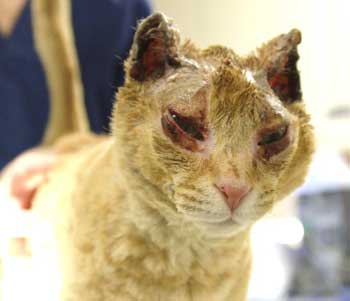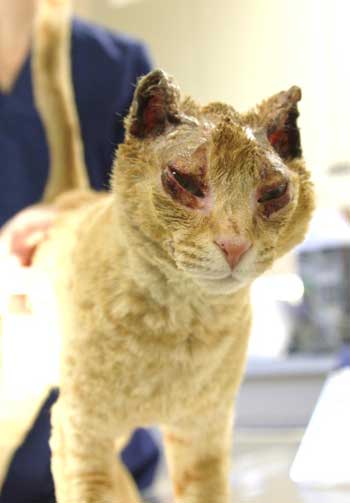Southern Oregon is widely regarded as one of the most animal-friendly areas in the country. Life is pretty good here for most house pets, farm animals, and wildlife. People here tend to adopt a homeless pet instead of buying them; we have more organic family farms in the area than horrific factory farms; wildlife habitat is abundant; and by and large, people around here seem to genuinely care about animals. That’s something to be proud of.
But as they say, pride goes before the fall. The fall I am referring to is the story of a stray cat named Meshach which you may have read about in the newspaper or seen on a local TV news report. His story is a cautionary tale that warns us of the dangers of becoming complacent about how we treat the animals we share our lives with.
To recap the basic facts, on December 22 a family in Eagle Point, Ore. called Jackson County Animal Care & Control for help. A friendly stray cat that had been seen wandering around the family’s neighborhood for weeks suddenly showed up on their doorstep suffering from severe burns around his eyes, ears, and underneath his tail.
The victim was immediately transported to Best Friends Animal Hospital in Talent, Ore. for emergency medical treatment. The staff there said it appeared that the orange tabby had been doused with a flammable liquid and then ignited.
Even though the staff at the Best Friends frequently deals with seriously injured animals, the condition of the cat reduced many of them to tears. Sansa Collins, animal care manager at Sanctuary One, was at the hospital when the cat arrived. “Bad as the cat looked, which was horrible,” she said, “the stench of burnt flesh and hair was the worst part. I’ll never forget that smell – it was the smell of evil.”
The hospital staff named the tabby Meshach (pronounced mee-shack), after a story in the Book of Daniel where divine intervention saved three devout young men from being burnt alive.
The burns on Meshach’s face were so extensive it was feared he would be blind, but almost miraculously his vision is unaffected. However, his ears were so badly burnt they required multiple surgeries. It is unclear what other challenges Meshach will face on his road to recovery, but Sanctuary One will provide a safe, loving home for Meshach to ensure he gets all the medical attention and therapy he needs to regain his physical and mental health.
On January 3, the Jackson County Sheriff’s Department launched an investigation into Meshach’s case to determine the cause of his injuries and whether or not a crime was committed.
Even if you don’t have soft spot for animals, you should care that potential animal abuse cases are investigated to determine whether or not it was an accident, because countless studies in psychology, sociology, and criminology have demonstrated that violent offenders frequently have childhood and adolescent histories of serious and repeated animal cruelty. The FBI has recognized the connection since the 1970s, when its analysis of the lives of serial killers suggested that most had killed or tortured animals as children. Other research has shown consistent patterns of animal cruelty among perpetrators of other forms of violence, including child abuse, spousal abuse, and elder abuse. In fact, the American Psychiatric Association considers animal cruelty one of the diagnostic criteria of conduct disorder.
What can you do to prevent animal abuse? Here are four things all of us can do to make a difference.
1. If you see an animal being abused, report it. Call 911 if an animal’s life is in immediate danger, otherwise a good place to start is to call the Jackson County Sherriff’s Department at 541.774.6800.
2. Get to know and look out for the animals in your neighborhood. By being aware, you’re more likely to notice abuse. Endangered animals can’t speak up for themselves, so sometimes we have to do it for them.
3. Support your local animal shelter, humane society, spay/neuter group, or a multi-species animal haven like Sanctuary One. Any amount you can afford to give will be appreciated. If you can’t afford to donate, volunteer help can be just as valuable.
4. And most importantly, be a good role model. If you have house pets or farm animals, be sure to always show them the love and good care they deserve. This includes talking to your kids about how to treat animals with respect. If you need help, contact us to make an appointment for a fun and educational tour of Sanctuary One. We love teaching people of all ages how to be kind to animals.
For more information, visit Sanctuary One on the Web at www.SanctuaryOne.org, or call 541.899.8627.

